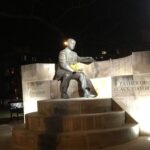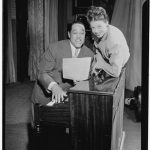It’s Black History Month, so I am continuing with the series of posts regarding Shaw resident and Father of Black History, Carter G. Woodson and his book The Mis-Education of the Negro, published in 1933.

This is a really short month and this book is 18 chapters. I am going to put this chapter in one post instead of breaking it up into two, though there are two thoughts I want to cover. The first thought is, was, the problem of Black Studies in the early 20th century, there wasn’t really. The second thought was the comparison he makes between European culture and African studies. This is going to be a really long post.
Black Studies, What Black Studies?
Carter G. Woodson is known as the father of Black History. He had to cobble together and create organizations for the study of African Americans because there was almost nothing in existence. So what he was noting (complaining about) was the lack of Black Studies as well as the problem of kind of education African Americans at all education levels received.
A further examination of their curricula shows, too, that invariably these Negro colleges offer courses in Greek philosophy and in that of modern European thought, but they direct no attention to the philosophy of the African. Negroes of Africa have and always have had their own ideas about the nature of the universe, time, and space, about appearance and reality, and about freedom and necessity. The effort of the Negro to interpret man’s relation to the universe shows just as much intelligence as we find in the philosophy of the Greeks. There were many Africans who were just as wise as Socrates.
and
Looking over the courses of study of the public schools, one finds little to show that the Negro figures in these curricula. In supplementary matter a good deed of some Negro is occasionally referred to, but oftener the race is mentioned only to be held up to ridicule…..
and (warning this contains the N word)
For example, the author has just received a letter from a lady in Pittsburgh complaining that the librarian in one of its schools insists upon reading to the children “a great deal of literature containing such words as `nigger,’ `Blackie,’ `Little Black Sambo,’ etc.” This lady, therefore, would like to place in that school some books by Negro authors. This is a commendable effort, but it comes a little late; we hope not too late. For centuries such literature has been circulated among the children of the modern world; and they have, therefore, come to regard the Negro as inferior. Now that some of our similarly mis-educated Negroes are seeing how they have been deceived they are awakening to address themselves to a long neglected work. They should have been thinking about this generations ago, for they have a tremendous task before them today in dispelling this error and counteracting the results of such bias in our literature.
The Black schools lacked positive images and histories of Africans and Afro-Americans. Woodson addressed a real problem in the education system. He ends the chapter with:
Here again, however, the effort to uproot error and popularize the truth comes rather late. The Negro since freedom has gone along grinning, whooping, and “cutting capers” while the white man has applied himself to the task of defining the status of the Negro and compelling him to accept it as thus settled forever. While the Negro has been idle, propaganda has gone far ahead of history. Unfortunately, too, Negro “scholars” have assisted in the production of literature which gives this point of view.
Overcorrecting and Comparing
This is America. For most of the United States’ history people of European decent have been the majority. Our primary language is a form of English, from England, in Britain. Our laws and culture are a tapestry of British and various immigrant additions. So what is and was taught in schools have a strong Euro-centric bent.
I have a graduate degree in European history and honestly it’s mainly the England and France Show where Spain gets dropped sometime after King Phillip and Germany, Russia, and the Netherlands make guest appearances from time to time.
Woodson makes comparisons with Europe and Africa. I understand why, but his overcorrection comes across as reaching for straws and fueling bad Afrocentric theories. He’s fighting against a society that says he and our people have contributed and achieved nothing.
If we had a few thinkers we could expect great achievements on tomorrow. Some Negro with unusual insight would write an epic of bondage and freedom which would take its place with those of Homer and Virgil. Some Negro with esthetic appreciation would construct from collected fragments of Negro music a grand opera that would move humanity to repentance. Some Negro of philosophic penetration would find a solace for the modern world in the soul of the Negro, and then men would be men because they are men.

Only time will tell if thinkers, writers, and orators such as Martin Luther King Jr, Frederick Douglass, and W.E.B. DuBois will be influential 100 and 1000 years from now. Musicians such as DC’s Duke Ellington, have been influential beyond their own lifetimes. There were notable Afro-American writers in and before Woodson’s time, but once again, we have to wait to see the degree to their level of influence over time. Virgil and Homer were Mediterranean dudes who lived over a thousand years ago. They had a head start. We are in the New World and acknowledging that does not diminish the greatness and influence of Ellington and Quincy Jones (still alive).
The more I think of it, great African American achievements that are also great American achievements are mainly from the 20th century and a little after when Woodson wrote this. DC born Dr. Charles Drew is credited for the blood bank system our modern medicine depends on. The most American food product, peanut butter, thank George Washington Carver. Try to have major surgery without blood. The American art form, Jazz comes out of African American culture and was developed by both White and Black artists. Rap, born in Black American urban centers, music has international influence from Germany to India and Latin America. It’s interesting to watch a Bollywood movie and see moves obviously inspired by/taken from African American Michael Jackson. But again, a mid-late 20th century thing.
Woodson writes:
…Some one has said that the music of Poland was inspired by incidents of a struggle against the despots invading and partitioning their prostrate land. The Greeks never had an art until the country was overrun by hostile Orientals. Some one then began to immortalize in song the sons who went forth to fight for the native land. Another carved in marble the thought evoked by the example of the Greek youth who blocked the mountain pass with his body or who bared his breast to the javelin to defend the liberty of his country. These things we call art.
In our own country the other elements of the population, being secure in their position, have never faced such a crisis; and the Europeans, after whose pattern American life is fashioned, have not recently had such experience. White Americans, then, have produced no art at all, and that of Europe has reached the point of stagnation. Negroes who are imitating whites, then, are engaged in a most unprofitable performance. Why not interpret themselves anew to the world?
I thought, surely there was an American art form (other than music) created prior to his book. But it seemed a lot of American art is European influenced from Dadaism, American Impressionism, and Art Deco are not strictly American. Once again, it’s not until a bit more into the 20th Century our country starts creating it’s own modern art forms (recognized as art).
The “Orientals” (yes, I know it’s a rug not a peoples) Woodson speaks of are the Persians, now Iranians, which we consider to be the Middle East. Think about the movie 300. But counter to what Woodson wrote, there was Greek art prior to Persian influence. “Again, one observes in some of these catalogues numerous courses in art but no well defined course in Negro or African art which early influenced that of the Greeks.” Woodson vaguely points to the Egyptian (African) influence on early Greek art. But he credits the whole continent with what belongs to the northeast corner of it. This is a bit of an overreach.
In his review of ancient European history (which leaves out the Brits, the Gauls, and the Germani who weren’t accomplishing much at the time) he compares them to a vague African culture. As I mentioned earlier, our American culture and history is heavily influenced by Europe (mainly Britain and France), which puts African culture and history at a disadvantage in this arena.
I mentioned this quote earlier, “Negroes of Africa have and always have had their own ideas about the nature of the universe, time, and space, about appearance and reality, and about freedom and necessity. The effort of the Negro to interpret man’s relation to the universe shows just as much intelligence as we find in the philosophy of the Greeks. There were many Africans who were just as wise as Socrates. ” There may have been great thinkers in Africa. We only know of Socrates because his students Plato and Xenophon wrote about him. What contemporaries wrote about the great philosophers of Africa? There were ancient Egyptian philosophers, but their influence was limited.
